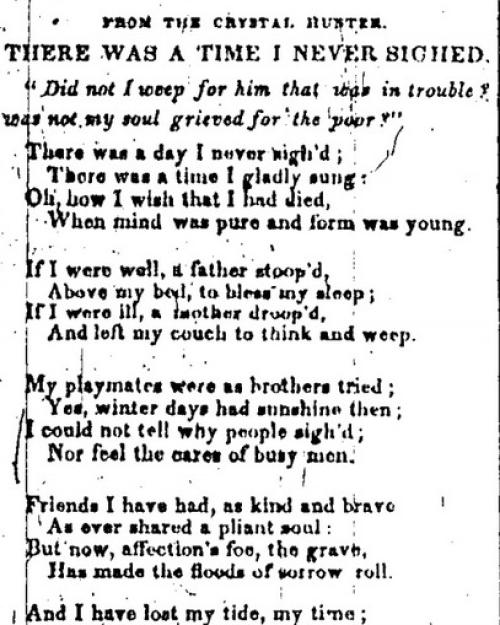A digital humanities project cataloging the work of 19th century poets has unearthed a trove of work that sheds light on life, history and issues of the time, including the campaign to end slavery.
Doctoral student Charline Jao was inspired to create Periodical Poets after taking a class by Derrick Spires, associate professor of Literatures in English in the College of Arts and Sciences, which introduced her to many publications from this period.
“Some of the poems in these periodicals are hard to find in other places or haven’t been anthologized, but I think they’re worthy of preservation and presentation,” Jao said. “They are fascinating historically, they memorialize the times when they were written, but they’re also poems about people and their social lives. And a lot of them are just wonderful artistically.”
For example, “The Slave Ship,” by William Palmer, printed in Freedom’s Journal in 1828, is from a poem spoken before the Anti-Slavery Society of Williams College, according to its introduction. “Thus, it gives us insight into how poetry played a role in oration, conventions and speeches.”
“Chain'd foot to foot and hand to hand,
The captives took their way,
Goaded along by scourge or brand,
Wearied and sad, to the distant strand
Where the darkling slave-ship lay.”
From “The Slave Ship” by William Palmer, printed in Freedom’s Journal in 1828
“Periodical Poets might be the first project (to my knowledge) that gives us a fine-grained look at poetry (both original and reprinted) published in Freedom’s Journal, Rights of All and other New York papers,” Spires said. “The project demonstrates the range of reading interests that Black newspapers cultivated, from poems ‘written for’ the newspapers to poems reprinted from other sources.
“The fact that much of this poetry was not written by Black writers also reminds us that Black newspapers, like most contemporaneous newspapers, were eclectic venues.”
After taking Spires’ class, Jao saw an email about the summer Digital Humanities Fellowships and applied, hoping to find a way to focus on these periodicals. The fellowship allowed her to create Periodical Poets.
The site includes 700 poems Jao discovered and transcribed from periodicals managed by Black editors in New York City. The site is searchable by publication, title, description, author and other parameters. The website also includes collections of poems focused on themes — from deaths and elegies to hymns and songs to British poets and women poets. Another section showcases a large collection of online and textual resources
Jao’s journal article, “’We Think Them Worthy’: A Digital Collection of Poetry from New York’s Nineteenth Century Black Periodicals,” appeared in American Periodicals in December 2022. The article includes an appendix of assignments that students could pursue, using the website as a resource. The phrase “we think them worthy” sometimes appeared in the periodicals alongside a poem, perhaps in a comment from a submitter or editor, Jao said.
“Periodical Poets will be a useful resource for teachers and researchers for years to come, and I’m excited to see where Jao’s digital work takes us next,” Spires said.
Jao also presented her work at a Society of Textual Scholarship conference and is slated to present this spring at the American Comparative Literature Association on work that uses Periodical Poets as a key source.
Many of the works she discovered show the importance of art and literature in political and social movements, in this case the emancipation movement in the U.S.
“I found poems that are famous and frequently cited, but a lot of them are anonymous,” she said. “Sometimes, a periodical was the first place the poem appeared, other times it is a reprinting. It tells us that people who are interacting with the newspaper are also interacting with poetry. Poems were read at schools, at meetings, in gatherings, and many of these newspapers will give us those details.”
Although Jao has moved on to other projects – mainly finishing her dissertation — she does return often to the website to imagine ways she could expand it to cover other cities or more rural areas. She also finds ties between the issues poets wrote about then and issues of today.
“There’s a productive thing that happens when you’re reading a lot about abolition,” she said. “That word is coming back in a meaningful way in our society — the abolition of the police, the abolition of prisons. Being able to look at these papers and spot parallels or similar struggles between then and now gave me a closer look at abolition and how it involves having to balance so many things – education, memorial, political organization, art – at the same time.”





